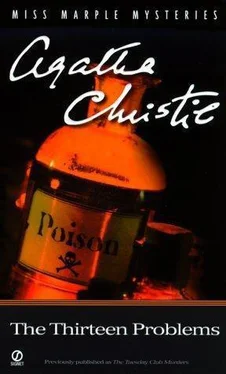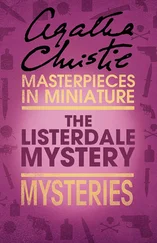Agatha Christie - The Thirteen Problems
Здесь есть возможность читать онлайн «Agatha Christie - The Thirteen Problems» — ознакомительный отрывок электронной книги совершенно бесплатно, а после прочтения отрывка купить полную версию. В некоторых случаях можно слушать аудио, скачать через торрент в формате fb2 и присутствует краткое содержание. Жанр: Классический детектив, на английском языке. Описание произведения, (предисловие) а так же отзывы посетителей доступны на портале библиотеки ЛибКат.
- Название:The Thirteen Problems
- Автор:
- Жанр:
- Год:неизвестен
- ISBN:нет данных
- Рейтинг книги:4 / 5. Голосов: 1
-
Избранное:Добавить в избранное
- Отзывы:
-
Ваша оценка:
- 80
- 1
- 2
- 3
- 4
- 5
The Thirteen Problems: краткое содержание, описание и аннотация
Предлагаем к чтению аннотацию, описание, краткое содержание или предисловие (зависит от того, что написал сам автор книги «The Thirteen Problems»). Если вы не нашли необходимую информацию о книге — напишите в комментариях, мы постараемся отыскать её.
The Thirteen Problems — читать онлайн ознакомительный отрывок
Ниже представлен текст книги, разбитый по страницам. Система сохранения места последней прочитанной страницы, позволяет с удобством читать онлайн бесплатно книгу «The Thirteen Problems», без необходимости каждый раз заново искать на чём Вы остановились. Поставьте закладку, и сможете в любой момент перейти на страницу, на которой закончили чтение.
Интервал:
Закладка:
Agatha Christie
The Tuesday Night Club
Unsolved mysteries.
Raymond West blew out a cloud of smoke and repeated the words with a kind of deliberate self-conscious pleasure.
Unsolved mysteries. He looked round him with satisfaction. The room was an old one with broad black beams across the ceiling and it was furnished with good old furniture that belonged to it. Hence Raymond West's approving glance. By profession he was a writer and he liked the atmosphere to be flawless. His Aunt Jane's house always pleased him as the right setting for her personality. He looked across the hearth to where she sat erect in the big grandfather chair. Miss Marple wore a black brocade dress, very much pinched in round the waist. Mechlin lace was arranged in a cascade down the front of the bodice. She had on black lace mittens, and a black lace cap surmounted the piled-up masses of her snowy hair. She was knitting — something white and soft and fleecy. Her faded blue eyes, benignant and kindly, surveyed her nephew and her nephew's guests with gentle pleasure. They rested first on Raymond himself, self-consciously debonair, then on Joyce Lemprière, the artist, with her close-cropped black head and queer hazel-green eyes, then on that well-groomed man of the world, Sir Henry Clithering. There were two other people in the room, Dr Pender, the elderly clergyman of the parish, and Mr Petherick, the solicitor, a dried-up little man with eyeglasses which he looked over and not through. Miss Marple gave a brief moment of attention to all these people and returned to her knitting with a gentle smile upon her lips.
Mr Petherick gave the dry little cough with which he usually prefaced his remarks. What is that you say, Raymond? Unsolved mysteries? Ha — and what about them?
Nothing about them, said Joyce Lemprière. Raymond just likes the sound of himself saying them.
Raymond West threw her a glance of reproach at which she threw back her head and laughed.
He is a humbug, isn't he, Miss Marple? she demanded. You know that, I am sure.
Miss Marple smiled gently at her but made no reply.
Life itself is an unsolved mystery, said the clergyman gravely.
Raymond sat up in his chair and flung away his cigarette with an impulsive gesture.
That's not what I mean. I was not talking philosophy, he said. I was thinking of actual bare prosaic facts, things that have happened and that no one has ever explained.
I know just the sort of thing you mean, dear, said Miss Marple. For instance Mrs Carruthers had a very strange experience yesterday morning. She bought two gills of picked shrimps at Elliot's. She called at two other shops and when she got home she found she had not got the shrimps with her. She went back to the two shops she had visited but these shrimps had completely disappeared. Now that seems to me very remarkable.
A very fishy story, said Sir Henry Clithering gravely.
There are, of course, all kinds of possible explanations, said Miss Marple, her cheeks growing slightly pinker with excitement. For instance, somebody else.
My dear Aunt, said Raymond West with some amusement, I didn't mean that sort of village incident. I was thinking of murders and disappearances — the kind of thing that Sir Henry could tell us about by the hour if he liked.
But I never talk shop, said Sir Henry modestly. No, I never talk shop.
Sir Henry Clithering had been until lately Commissioner of Scotland Yard.
I suppose there are a lot of murders and things that never are solved by the police, said Joyce Lemprière.
That is an admitted fact, I believe, said Mr Petherick.
I wonder, said Raymond West, what class of brain really succeeds best in unravelling a mystery? One always feels that the average police detective must be hampered by lack of imagination.
That is the layman's point of view, said Sir Henry dryly.
You really want a committee, said Joyce, smiling. For psychology and imagination go to the writer. — She made an ironical bow to Raymond but he remained serious.
The art of writing gives one an insight into human nature, he said gravely. One sees, perhaps, motives that the ordinary person would pass by.
I know, dear, said Miss Marple, that your books are very clever. But do you think that people are really so unpleasant as you make them out to be?
My dear Aunt, said Raymond gently, keep your beliefs. Heaven forbid that I should in any way shatter them.
I mean, said Miss Marple, puckering her brow a little as she counted the stitches in her knitting, that so many people seem to me not to be either bad or good, but simply, you know, very silly.
Mr Petherick gave his dry little cough again.
Don't you think, Raymond, he said, that you attach too much weight to imagination? Imagination is a very dangerous thing, as we lawyers know only too well. To be able to sift evidence impartially, to take the facts and look at them as facts — that seems to me the only logical method of arriving at the truth. I may add that in my experience it is the only one that succeeds.
Bah! cried Joyce, flinging back her black head indignantly. I bet I could beat you all at this game. I am not only a woman — and say what you like, women have an intuition that is denied to men — I am an artist as well. I see things that you don't. And then, too, as an artist I have knocked about among all sorts and conditions of people. I know life as darling Miss Marple here cannot possibly know it.
I don't know about that, dear, said Miss Marple. Very painful and distressing things happen in villages sometimes.
May I speak? said Dr Pender smiling. It is the fashion nowadays to decry the clergy, I know, but we hear things, we know a side of human character which is a closed book to the outside world.
Well, said Joyce, it seems to me we are a pretty representative gathering. How would it be if we formed a Club? What is today? Tuesday? We will call it The Tuesday Night Club. It is to meet every week, and each member in turn has to propound a problem. Some mystery of which they have personal knowledge, and to which, of course, they know the answer. Let me see, how many are we? One, two, three, four, five. We ought really to be six.
You have forgotten me, dear, said Miss Marple, smiling brightly.
Joyce was slightly taken aback, but she concealed the fact quickly. That would be lovely, Miss Marple, she said. I didn't think you would care to play.
I think it would be very interesting, said Miss Marple, especially with so many clever gentlemen present. I am afraid I am not clever myself, but living all these years in St Mary Mead does give one an insight into human nature.
I am sure your co-operation will be very valuable, laid Sir Henry, courteously.
Who is going to start? said Joyce.
I think there is no doubt as to that, said Dr Pender, when we have the great good fortune to have such a distinguished man as Sir Henry staying with us.
He left his sentence unfinished, making a courtly bow in the direction of Sir Henry.
The latter was silent for a minute or two. At last he sighed and recrossed his legs and began: It is a little difficult for me to select just the kind of thing you want, but I think, as it happens, I know of an instance which fits these conditions very aptly. You may have seen some mention of the case in the papers of a year ago. It was laid aside at the time as an unsolved mystery, but, as it happens, the solution came into my hands not very many days ago.
The facts are very simple. Three people sat down to a supper consisting, amongst other things, of tinned lobster. Later in the night, all three were taken ill, and a doctor was hastily summoned. Two of the people recovered, the third one died.
Ah! said Raymond approvingly. As I say, the facts as such were very simple. Death was considered to be due to ptomaine poisoning, a certificate was given to that effect, and the victim was duly buried. But things did not rest at that.
Читать дальшеИнтервал:
Закладка:
Похожие книги на «The Thirteen Problems»
Представляем Вашему вниманию похожие книги на «The Thirteen Problems» списком для выбора. Мы отобрали схожую по названию и смыслу литературу в надежде предоставить читателям больше вариантов отыскать новые, интересные, ещё непрочитанные произведения.
Обсуждение, отзывы о книге «The Thirteen Problems» и просто собственные мнения читателей. Оставьте ваши комментарии, напишите, что Вы думаете о произведении, его смысле или главных героях. Укажите что конкретно понравилось, а что нет, и почему Вы так считаете.












